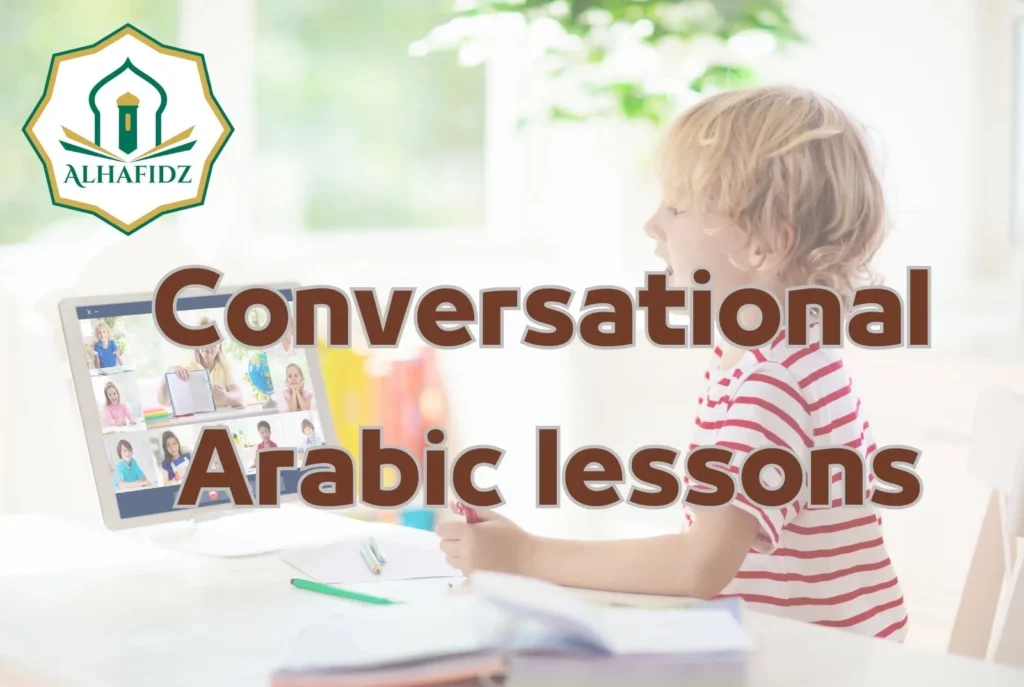conversational arabic lessons is one of the most important skills that many people seek to master, given the importance of the Arabic language as an official language in many countries and international entities. Good conversation contributes to enhancing effective communication, helps in understanding Arabic culture and interacting with its speakers.
This skill provides the opportunity to express ideas and feelings clearly, and opens new doors to get to know friends and expand social networks. By practicing conversational arabic lessons, learners can improve their listening and pronunciation skills, and develop vocabulary and grammar, which makes it easier for them to engage in multiple environments, whether academic, practical or social.
What are the most prominent ways to learn conversation in Arabic?
There are many ways to learn conversational arabic lessons, which makes it easy for learners to choose the method that suits them.

Here are some effective methods:
- Daily practice: Allocating time every day to speak Arabic, whether with friends or family, helps enhance language skills.
- Listening and watching: Watching movies, TV shows, and podcasts in Arabic can improve listening and pronunciation skills.
- Participate in educational courses: Join conversational arabic lessons offered by language learning centers or online learning platforms.
- Use language applications: Apps such as “Duolingo” and “Hello Talk” provide opportunities to speak with native speakers and practice the language.
- Read texts aloud: Reading articles or stories aloud can help improve pronunciation and fluency.
- Interact in language communities: Join groups or online forums where Arabic is spoken.
- Sign up for group chats: Participate in workshops or conversational arabic lessons with other learners to enhance language interaction.
- Identify conversation topics: Choose specific topics for discussion, such as culture or news, which helps expand vocabulary.
- Use flash cards: Create cards containing common phrases and vocabulary and use them in conversation.
- Talk with native speakers: Find a language partner or tutor to practice conversation and review mistakes.
Steps to learn conversation at home
Here are effective steps to learn conversational arabic lessons at home:
- Set a specific time: Set a specific time every day to practice conversation, even if it is for 15-30 minutes.
- Talking to yourself: Use the mirror to talk to yourself, you can choose a specific topic and talk about it. This helps improve fluency and self-confidence.
- Practicing conversations with friends or family: Try to have conversations in Arabic with family members or friends. You can select specific topics for discussion.
- Using audio-visual resources: Watch movies or TV shows in Arabic, and try to imitate the pronunciation and phrases you hear.
- Reading aloud: Choose Arabic texts, whether articles or stories, and read them out loud. This helps improve pronunciation and increases your vocabulary.
- Recording yourself: Use your phone to record your conversations or readings. After that, listen to the recordings and identify areas that need improvement.
- Using flash cards: Create cards containing common phrases and words, and try to use them in your daily conversations.
- Practice online interaction: Join chat groups on platforms such as Zoom or Skype, or use apps such as HelloTalk to communicate with Arabic speakers.
- Identify conversation topics: Choose specific topics for discussion, such as news, culture, or hobbies, to expand your vocabulary and enhance your ability to express yourself.
- Repetition and review: Review the words and phrases you have learned periodically, and repeat their use in your daily conversations.

Ready to speak Arabic with confidence? Enroll now and start your journey to fluency!
What is the importance of learning Arabic conversation?
The importance of conversational arabic lessons is enhanced in several aspects, including:
- Enhancing communication: Good conversation in Arabic enables effective interaction with native speakers, which facilitates understanding different cultures and customs.
- Opening up job opportunities: Arabic is one of the languages in demand in many fields, which increases job opportunities in local and international companies.
- Understanding Arabic culture: Through conversational arabic lessons, the learner can understand the different nuances and traditions that reflect the cultural identity of Arabs.
- Improving language skills: Practicing conversation enhances listening and pronunciation skills, and helps expand vocabulary and better understand grammar.
- Social interaction: Conversation contributes to building strong social relationships, which enhances the spirit of cooperation and understanding between individuals.
- Facilitating academic learning: For beginners in studying or studying in the Arabic language, the ability to converse facilitates understanding and discussion in academic subjects.
- Enjoying culture and arts: Through conversation, you can enjoy Arabic music and literature, and understand movies and TV shows more deeply.
- Boosting self-confidence: The more conversation skills you have, the more confident you will be in talking to others, whether in daily life or in professional settings.
- Adapting to new environments: Learning to converse helps you adapt better when moving to an Arabic-speaking country, which facilitates integration into society.
- Expanding social networks: Through conversation, you can build relationships with people from different backgrounds and cultures, which enriches the personal experience.
Conclusion
In conclusion, conversational arabic lessons becomes clear that this skill represents a bridge to effective communication and mutual understanding. Improving the ability to converse enhances self-confidence and opens up new horizons in various areas of life.
Therefore, it is important for individuals to continue practicing this skill, by engaging in daily conversations, listening to native speakers, and interacting with diverse Arabic content. At the same time, modern technologies and social media contribute to facilitating learning conversation.
FAQS
How can I learn to converse in Arabic?!
It is worth noting that there are multiple ways to learn conversation, including conversation courses.
What is the best site for learning Arabic?
Al-Hafiz Academy is the best for learning the Arabic language.
